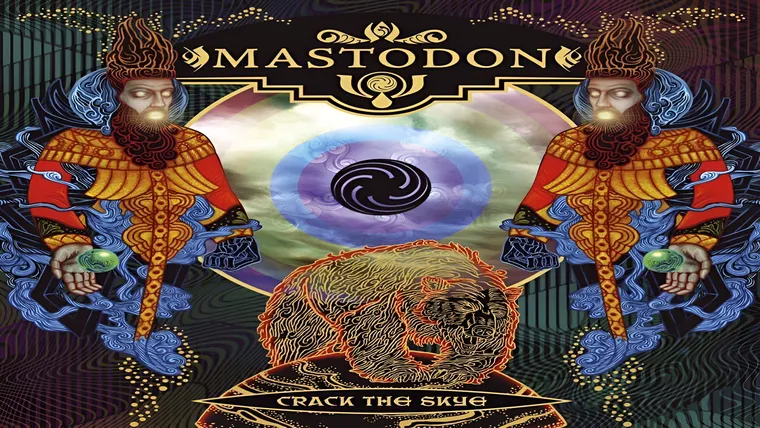Released on March 24, 2009, Crack the Skye marked a turning point for Mastodon, elevating them from one of metal’s most exciting modern acts to a band capable of crafting true sonic epics. With its intricate compositions, conceptual depth, and expansive melodies, the album saw Mastodon pushing beyond their sludge-metal roots into more progressive and atmospheric territory.
Unlike their earlier, more aggressive works, Crack the Skye embraced soaring melodies, psychedelic influences, and deeply personal themes, making it one of the most unique and emotionally powerful metal albums of its era.
By the late 2000s, Mastodon had already cemented themselves as one of the most innovative bands in modern metal. Their previous album, Blood Mountain, had expanded their sound with more progressive elements, while Leviathan before it established their reputation as masters of concept-driven heavy music. Amidst a metal landscape dominated by technical brutality and extreme aggression, Mastodon carved out a different path—one that blended heaviness with introspection, storytelling, and breathtaking musicianship.
By the time Crack the Skye was recorded, Mastodon had solidified their now-classic lineup: Troy Sanders on bass and vocals, Brent Hinds and Bill Kelliher on guitars, and Brann Dailor on drums and vocals. The band had already proven their technical prowess, but this album saw them refine their songwriting, embracing longer, more intricate compositions while maintaining the raw energy that had defined their earlier work.
Brent Hinds and Bill Kelliher’s guitar work took center stage, weaving together intricate harmonies, soaring solos, and crushingly heavy riffs. Troy Sanders’ bass lines added depth and melody, often working in tandem with the guitars to create a rich, layered sound. At the heart of it all was Brann Dailor, whose drumming was as dynamic as ever—effortlessly shifting between explosive fills, precise grooves, and jazzy flourishes that added a unique rhythmic complexity to the album.
Vocal duties were more balanced than ever before, with Hinds, Sanders, and Dailor all contributing to the album’s expansive vocal textures. This shift added a new melodic dimension to Mastodon’s sound, creating moments of haunting beauty amidst the heaviness.
Reflecting on the band’s approach to the album, Brann Dailor said:
“This record was deeply personal for us. It was a tribute, a journey, and a story that we poured everything into. It wasn’t just about being heavy—it was about emotion, atmosphere, and telling a story through the music.”
That sense of emotion and depth is present throughout Crack the Skye. Every track is part of a larger narrative, blending themes of astral projection, Russian mysticism, and personal loss into an intricate conceptual journey.
What truly sets Crack the Skye apart is its cinematic scope. While many progressive metal albums focus on technicality and complexity, Mastodon approached this album with a sense of space and atmosphere, allowing each song to breathe and evolve organically. The result is an album that feels like an odyssey—both musically and emotionally.
Even in its heaviest moments, the album retains a sense of melody and grandeur. Songs like “Oblivion” and “Divinations” showcase Mastodon’s ability to balance crushing riffs with anthemic vocal lines, while tracks like “The Czar” and the title track take listeners on sprawling, multi-part journeys filled with shifting moods and textures.
Reflecting on the album’s themes, Troy Sanders said:
“We wanted to create something that felt larger than life, something that took the listener on a journey. It was inspired by personal experiences but also by the idea of transcendence—of moving beyond pain and into something greater.”
This philosophy is what makes Crack the Skye a landmark in progressive metal. It’s not just an album—it’s an experience, a story told through waves of sound, emotion, and technical brilliance.
Produced by Brendan O’Brien, whose work with bands like Pearl Jam and AC/DC brought a polished yet organic sound, Crack the Skye captured Mastodon’s evolution with stunning clarity. Unlike some progressive metal albums that get lost in excessive technicality, this record maintained a perfect balance of complexity and accessibility, allowing every intricate detail to shine while still delivering raw emotional impact.
Upon its release, Crack the Skye was both a critical and commercial success, earning widespread acclaim and solidifying Mastodon as one of the most important metal bands of their generation. It bridged the gap between progressive metal’s ambition and sludge metal’s raw intensity, proving that heavy music could be both intellectually stimulating and deeply moving.
Over the years, the album’s influence has only grown. Many bands have drawn inspiration from its fusion of melody, storytelling, and heaviness, and its songs remain fan favorites in Mastodon’s live performances, still resonating with audiences worldwide. Even as Mastodon has continued to evolve, Crack the Skye remains a defining moment in their career—a record that pushed boundaries and redefined what modern metal could be.
Reflecting on its legacy, Brent Hinds said:
“I think Crack the Skye was the moment we really found our voice. It was a turning point, and looking back, it still feels like one of the most important things we’ve ever done.”
Final Verdict: 9.5/10
Standout Tracks:
- “Oblivion”
- “Divinations”
- “Quintessence”
- “The Czar”
- “Ghost of Karelia”
- “Crack the Skye”
- “The Last Baron”
Crack the Skye isn’t just one of Mastodon’s greatest albums—it’s one of the defining albums of modern progressive metal. With its sweeping compositions, deep emotional core, and masterful musicianship, it remains essential listening for any metal fan. Whether you’re experiencing it for the first time or revisiting it years later, this album stands as a testament to Mastodon’s ability to blend heaviness, melody, and storytelling into something truly transcendent.
Until next time, play it loud, friends!

